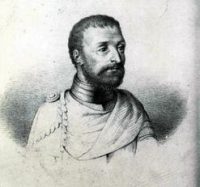[Humabon receives a report that Lapulapu, a ruler of Mactan, refuses to recognize the King of Spain.]
Viernes 26 de abril, Zula, uno de los jefes de la isla de Matan, remitió al comandante, con uno de sus hijos, dos cabras, con encargo de decirle que si no le enviaba todo lo que le había prometido, no era culpa suya sino del otro jefe llamado Cilapulapu, que no quería reconocer la autoridad del rey de España; pero que si a la noche siguiente quería despachar en su auxilio una chalupa con hombres armados, se comprometía a batir y subyugar enteramente a su rival.
Con este mensaje, el comandante se resolvió a ir allí en persona con tres chalupas, y aunque le rogamos que no fuese, nos respondió que, como buen pastor, no debía abandonar su rebaño.
Partimos a media noche, provistos de coraza y de casco, en número de sesenta, el rey cristiano, el príncipe su yerno y varios jefes de Zubu, con cierto número de hombres armados que nos siguieron en veinte o treinta balangayes: y habiendo llegado a Matan tres horas antes de que aclarase, el comandante resolvió no atacar, sino que envió a tierra al moro para que dijese a Cilapulapu y a los suyos que si querían reconocer la soberanía del rey de España, obedecer al rey cristiano de Zubu, y pagar el tributo que acababa de pedírseles, serían considerados como amigos, y que en caso contrario, conocerían la fuerza de nuestras lanzas. Los isleños no se amedrentaron con nuestras amenazas, respondiendo que tenían también lanzas, aunque sólo de cañas puntiagudas y estacas endurecidas al fuego.
Pidieron sólo que no se les atacase durante la noche porque con los refuerzos que esperaban se habían de hallar en mayor número: lo que decían maliciosamente para animarnos a que los atacásemos inmediatamente, con la esperanza de que caeríamos en los fosos que habían excavado entre la orilla del mar y sus casas.
[96] On Friday, 26 April, Zula, a chief of the island of Mactan, sent one of his sons to present two goats to the captain-general, and to say that he would send him all that he had promised, but that he had not been able to send it to him because of the other chief, Cilapulapu, who refused to obey the king of Spain; he requested the captain to send him only one boatload of men on the next night, so that they might help him to fight against the other chief. The captain-general decided to go there with three boatloads. We begged him repeatedly not to go, but he, like a good shepherd, refused to abandon his flock. At midnight, sixty of our men set out armed with corselets and helmets, together with the Christian king, the prince, some of the chief men, and twenty or thirty balanghai; three hours before dawn, we reached Mactan. The captain did not wish to fight then, but sent a message to the natives by the Moor to the effect that if they would obey the king of Spain, recognize the Christian king as their sovereign, and pay us our tribute, he would be their friend; but that if they wished otherwise, they should expect to see how our lances wounded. They replied that if we had lances, they had lances of bamboo and stakes hardened with fire; [they asked us] not to proceed to attack them at once, but to wait until morning, so that they might have more men. They said that in order to induce us to go in search of them; for they had dug certain pitfalls between the houses in order that we might fall into them.
Araw ng Biyernes, ikadalawampu’t anim ng Abril, ipinadalá ni Zula, isang pinunò sa isla ng Matan, ang isa sa mga anak niyang laláki upang maghandog ng dalawang kambing sa kapitán-heneral, at upang sabihing ipadadalá ang lahat ng kaniyang ipinangako, ngunit hindi niya ito naipadalá sa kaniya dahil ayaw sundin ng isa pang pinunò, si Cilapulapu, ang hari ng España. Ipinakiusap niya sa kapitán na padalhan siyá ng isang bangka lámang na punô ng mga tauhan sa susunod na gabí upang matulungan nilá siyáng labánan ang kabilâng pinunò. Nagpasiya ang kapitán-heneral na pumunta doon na may tatlong bangka. Nagmakaawa kami sa kaniyang huwag nang pumunta, ngunit para siyáng mabuting pastol na ayaw pabayaan ang kaniyang mga tupa. Pagkahatinggabi, animnapu sa amin ang naglakbay, armado ng mga corselet at helmet, kasáma ang haring Kristiyano, ang prinsipe, ilan sa mga pangunahing laláki, at dalawampu o tatlumpung balanghai. Dumatíng kami sa Matan tatlong oras bago ang bukang-liwayway. Ayaw noong lumaban ng kapitán, ngunit nagpadalá ng mensahe sa mga katutubo sa pamamagitan ng Muslim na, sa madalîng sabi, kapag sumunod silá sa hari ng España, kilalanin ang haring Kristiyano bílang kaniláng pinunò, at magbayad sa amin ng buwis, magiging kaibigan nilá siyá; ngunit kung hangad nilá ang kasalungat, dapat siláng mag-antay upang makita kung paano sumugat ang aming mga sibat. Sumagot siláng kung mayroon kaming mga sibat ay mayroon siláng mga sibat ng kawayan at mga tulos na pinatigas ng apoy. [Hiningi nilá sa aming] huwag siláng suguring kaagad-agad, at bagkus ay mag-antay sa umaga, upang magkaroon silá ng mas maraming tao. Sinabi nilá iyon upang akitin kaming hanapin silá; sapagkat naghukay silá ng ilang bútas sa lupa sa pagitan ng mga bahay upang mahulog kami sa mga ito.
